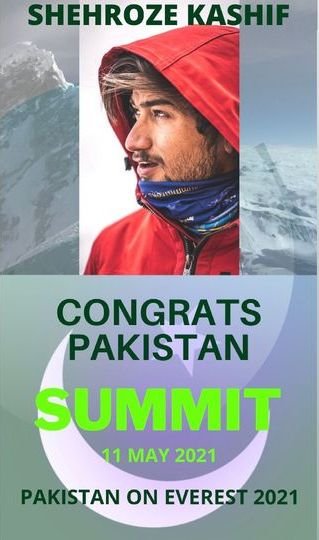Doha, 27 July 2021 (Media Reports)
Shehroze Kashif, 19, from Lahore, Pakistan became the youngest Pakistani mountaineer to conquer 8,848.86 metres high Mount Everest last Tuesday.
Shehroze developed his passion in trekking from his very young age encouraged by his father, Kashif Abbas. Kashif Abbas and any of his family members has no interest in mountaineering.
He spent over a month in accomplishing his target. In an interview to media, he said that strongest thing in the world is the human mind, 'mountaineering does not ask for compromise, mountaineering asks for sacrifice'. Fitness is utmost important and specially in decision making at heights, he said.
He is also the youngest Pakistani is his age 17, climbed Broad Peak, 8,047m, which earned him ' The Broad Boy'. Teen in his age of 11, trekked 3,885 m Makra Peak, followed by 4,080 m Musa Ka Musalla.
Later, he did the Gondogor La, K2 Base Camp trek at the age of 14 and at age 15 completed 'Khurdo Pin Pass', 5,800 m. To his profile added at his age of 18, he did Khusar Gang, a 6,050m peak Alpine style.
Expedition cost his father Rupees 10 million, without any government backing or from private sector.
Pakistani mountaineer Nazir Sabir was the first Pakistani to climb Everest on May 17, 2000. Years later, Hasan Sadpara, Samina Baig, Abdul Jabbar Bhatti and Mirza Ali reached the top of the tallest 8,000m peak. So far, all Pakistani summits have been done with the use of supplemental oxygen.
Pakistan, Nepal and China are home to World's 14 highest peaks, the 8,000ers. World’s tallest mountain Everest, 8,848 m is located in Nepal, Pakistan is home to five 8,000 m peaks - K2, Gasherbrum 1 and 2, Broad Peak and Nanga Parbat.
Alpine approach in mountaineering is where no supplementary oxygen, packing light, zero reliance on fixed ropes, thus making riskier for climber over 6,000m as the altitude increases.
Alpine (Expedition or “siege” style) relies on fixed ropes set along the climbing routes by Sherpas/HAPs and the use of bottled oxygen.
Above 8,000 m, pressure of Oxygen is insufficient to sustain human life for a longer span, known as 'Death Zone', most relying on bottled oxygen.










